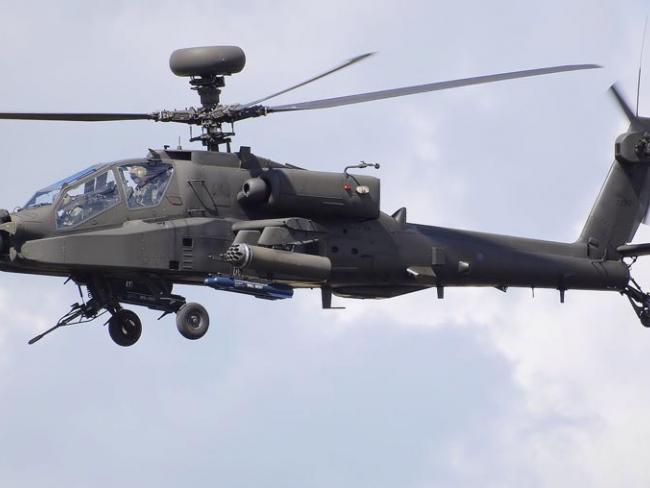22 September 2016

British AgustaWestland Apache helicopters were used to attack Pro-Gaddafi forces from the British amphibious assault ship HMS Ocean. Photo Adrian Pingstone (public domain)
The House of Commons Foreign Affairs Committee report into Britain’s role in the toppling of Muammar Gaddafi, published last week, is a stunning indictment of the British state’s attack on Libya in March 2011 in partnership with France and the United States.
Equally damned – if only by implication – is the House of Commons itself. After all, Parliament approved Britain’s participation in the military intervention on 21 March 2011 by 557 votes to 13.
Every aspect of the government’s action is slammed, starting with its ignorance. “This policy was not informed by accurate intelligence. In particular, the Government failed to identify that the threat to civilians was overstated and that the rebels included a significant Islamist element,” reads the summary.
Worse, there was no strategy, says the committee. “By the summer of 2011, the limited intervention to protect civilians had drifted into an opportunist policy of regime change. That policy was not underpinned by a strategy to support and shape post-Gaddafi Libya.”
Predictable
The result was predicted by many: “…political and economic collapse, inter-militia and inter-tribal warfare, humanitarian and migrant crises, widespread human rights violations, the spread of Gaddafi regime weapons across the region and the growth of ISIL in North Africa.”
And the committee points the finger squarely at Cameron: “Through his decision making in the National Security Council, former Prime Minister David Cameron was ultimately responsible for the failure to develop a coherent Libya strategy.”
When Cameron got parliament to agree military intervention in Libya on 21 March 2011, he assured the House of Commons that the object of the intervention was not regime change. That’s not what he said a month later, when he signed a joint letter with Barack Obama and French President Nicolas Sarkozy that set out “their collective pursuit of ‘a future without Gaddafi’,” says the report.
The outcome could have been predicted. The Committee says that even without hindsight it was clear that jihadist groups would attempt to benefit from the rebellion. “Libyan connections with transnational militant extremist groups were known before 2011, because many Libyans had participated in the Iraq insurgency and in Afghanistan with al-Qaeda,” it notes.
Embargo breached
In fact, as the committee notes, these groups were actively and consciously supported. While UN resolution 1973 called on countries to implement a strict arms embargo, “we were told that the international community turned a blind eye to the supply of weapons to the rebels.”
Indeed, as the Committee observes, it was a lot more than a blind eye: “The combat performance of rebel ground forces was enhanced by personnel and intelligence provided by states such as the UK, France, Turkey, Qatar and the United Arab Emirates. For example, Lord Richards [the Chief of the Defence Staff at the time] told us that the UK ‘had a few people embedded’ with the rebel forces.” Lord Richards highlighted ‘the degree to which the Emiratis and the Qataris … played a major role in the success of the ground operation’.”
‘And the lies and intervention continue today.’
And the lies and intervention continue today. “British Special Forces have reportedly been deployed to Libya, where they apparently engaged in frontline combat in May 2016,” notes the committee. “It is difficult to square reports of British Special Forces participating in combat with the comment by the Secretary of State for Defence in May 2016 that ‘we do not intend to deploy ground forces in any combat role. Before engaging in any military operation in Libya, we would of course have to seek an invitation from the Libyan Government, and would also have to involve this Parliament.’”
This intervention comes despite the fact that Libya’s “Government of National Accord” has not asked Britain to deploy combat troops on its soil, and the House of Commons has not even discussed it. Foreign and Commonwealth Office Minister Tobias Ellwood acknowledged that the RAF had flown missions over Libya in 2016.
Migration crisis
The war was a major cause of Europe’s vast migration crisis. When the crisis started to unfold, Italy implemented a national programme called Operation Mare Nostrum. The next year, that scheme was withdrawn and the EU took charge, assuming responsibility for border patrol functions in November 2014 under Operation Triton. The committee is unimpressed at the results: “The International Organization for Migration has calculated that 30 times as many migrants died between January and April 2015 under Operation Triton as in the same period in 2014 under Operation Mare Nostrum.”
Above all, the intervention has been a disaster for Libya. The United Nations Human Development Report 2010 – a UN aggregate measure of health, education and income – ranked Libya the 53rd most advanced country in the world, the most advanced country in Africa. Five years later Libya had slipped to 94th. Meanwhile, according to the World Bank, Libya’s per capital income had crashed from $12,250 in 2010 to $6,030.
• Libya: Examination of intervention and collapse and the UK’s future policy options (PDF), House of Commons Foreign Affairs Committee, Third Report of Session 2016–17, Report, together with formal minutes relating to the report. Ordered by the House of Commons to be printed 6 September 2016.
